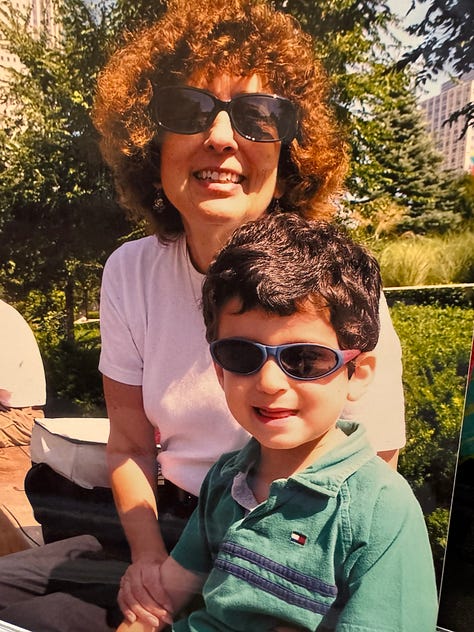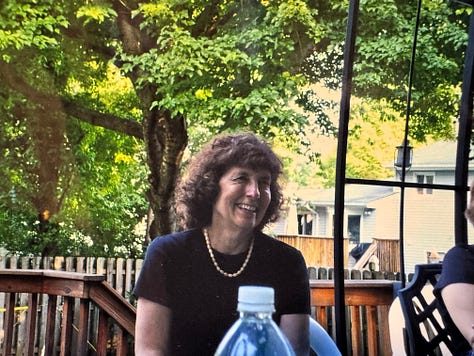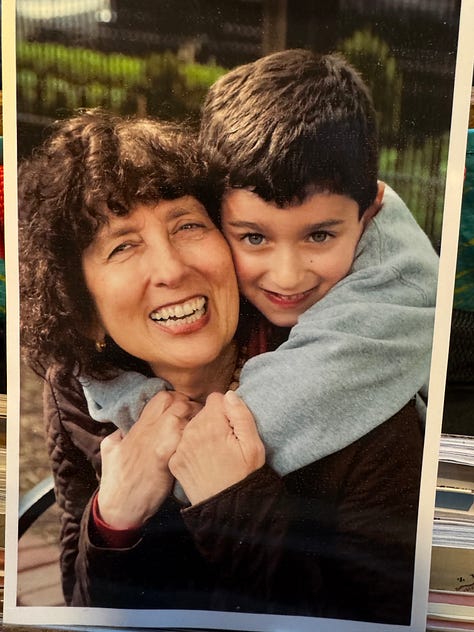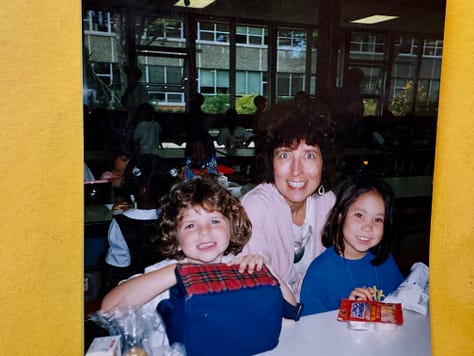What Will Really Matter on Your Deathbed
I’ve never been around someone who was dying. I’ve never really been around death. Now, I’ve experienced both.
My mother died today, December 21st, Saturday, at 1:30 pm.
She was in her bedroom at the assisted living facility where she’d begrudgingly (putting it mildly) moved two months ago. The afternoon light came in from the window. The bed was raised, so she was sitting up with a rolled-up blanket under her neck for comfort. She breathed through her mouth, labored, and wasn’t awake. The room wasn’t quiet but seemed quiet despite the drone of the oxygen machine—and even with the radio playing the Metropolitan Opera’s live performance of Mozart’s “The Magic Flute.”
My mother had no followers on social media, had never been in the newspaper, wasn’t ever asked for her autograph, and meant so much to so many people—as a teacher in Brussels and Ethiopia where she and my father lived, as a principal of several elementary schools, and as the assistant superintendent of Evanston. She had a PhD in linguistics from Northwestern (yes, it runs in the family). Travel was something she craved and was mildly addicted to, particularly Paris, London, and anywhere with cave paintings or an archeological site. She loved Lindt Dark Chocolate with Sea Salt, salami and cheese sandwiches, Lays potato chips, a really good filet mignon, and dunked her morning toast in milk.
Even after Alzheimer’s had obscured her ability to find her bedroom and tell time and read (her other love), she could talk endlessly about ancient man and ancient Egypt and politics. Theater too—she couldn’t get enough of it.
She went to every one of the Met’s “Live in HD” performances. (They broadcast an opera at cinemas around country.) They were always on a Saturday—about one a month during the season. She went with her dear friend. Alzheimer’s would make her terrified and anxious because every moment was new and strange, but after five hours at the opera, she’d come back glowing.
These past seven days—ever since my mother had a stroke last Saturday—have been stunningly painful and strangely magical.
The Beginning
The morning of her stroke, she was at Circle of Friends, the memory care day program, because she had Alzheimer’s and was declining rapidly. They said she was smiling and talking. I picture her curly black hair that she continued to dye though she was eighty-three. Her eyes smiling, talking to someone, connected to them, really listening.
The next minute, she was slumped over and unresponsive. They rushed her to the emergency room.
For my sister and me, this is where it got fuzzy. You’d think that a Do Not Resuscitate (DNR) order would eliminate any doubt the family might have as to their loved one’s wishes.
Turns out there are many shades of not wanting to be “resuscitated,” i.e., brought back to life or (note the terminology) woken: surgery? intubation? feeding tube? medications? Which of these are “okay” and which isn’t? (Please, if there’s one thing you do, sit down with your doctor and list each and every medical procedure you want and which you don’t as you near the end of your life.)
My mother was rushed into surgery, which seemed right, mainly because it was “successful.” But the stroke affected the part of the brain responsible for waking. She wasn’t in a restful sleep—and not on a ventilator so not in a coma—but never really woke in the fullest sense of the word.
Still, my mother was extraordinary, even in sleep. When I told two nurses in the ICU that I was Lynn McCarthy’s daughter in room 1046, they said, “Oh, we love Lynn.” I thought, People love her and she isn’t even awake.
Of course I wanted her alive. But with Alzheimer’s and the damage from the stroke, we knew not to continue. She was aware of her mental decline and for a woman of her intelligence, it was excruciating. The last eight years had been taken up by too many hospital stays—a previous stroke, a subdural hematoma, Afib, etc. She never wanted to go back. When she was in the hospital last March, getting test after test, disoriented and untethered, she tried to go AWOL. My sister and I got texts telling us that she was going to escape at 3 AM and at 3 AM, she put on her clothes and was gently stopped and redirected by the security guard. Over the past month, she’d refused to go to the emergency room or even the doctor.
But what if she’d want to just the IV but not the oxygen, what if...?
It was three days of something like hell.
Finally, my sister and I decided she’d actually wanted a Do Not Intervene (DNI) order. The neurology team looked visibly relieved at our Plan of Care meeting. Her neurologist and primary care physician both said that with her stroke and her Alzheimer’s, it was the best thing.
I left the hospital and went home, hoping a break would make me feel better. It all felt so wrong.
My friend Mary isn’t a minister but should be. She said, “Go down there and talk to her.”
It was evening. I walked downtown, went to my mother’s hospital room, and sat next to her bed, ready to explain what we were doing. I needed her to know. I needed her to be okay with it even if I never got a response.
I said, “Mom, I love you.”
And in a kind of garble—her lips dry, her face pale—she said, “I love you too, Sarah.”
“Mom, I need to know that we’re doing the right thing. No more doctors, no more surgeries, right?”
I waited.
She mumbled, “No more doctors, no more surgeries.”
I ran out and got the nurse. With her as my witness, I asked my mom again. And again, she said, “No more doctors, no more surgeries.”
When the nurse left, I started to cry—bawl, really. I was sniffling and crying. And sniffling. And my mother said, “What’s that noise?” I said, “It’s me. Sniffling.” With disdain, she said, “Oh,” as if to ask why.
The middle
The next morning my sister and my sister’s rabbi Shoshana were with her. Shoshana is one of those magical people who just knows. She was talking to my mother about how important she was and how many lives she touched. And my mother started to cry.
That’s what will make you cry with something like joy or contentment on your deathbed: that you’ve helped people, been good to them, even strangers. That’s it.
It’s not the number of trips you take, not your bank account, not the number of friends or followers or subscribers or fans, not even your family, not your weight or the color of your hair. It’s that you’ve been good to the people all around you.
After that, she never had a fully wakeful moment.
The end
We moved her back to her “home” and hospice came. Hospice—my goodness, who invented it and created such amazing people? Amy, the hospice nurse, explained how it would go for my mother (and for most of us): first a fever, then the fingers and toes turn blue because the heart isn’t strong enough to pump blood to the extremities, then a gurgling sound might form in the throat, and then…it’s just whenever they decide to leave.
My mother had been in the assisted living facility for only a few months. Yet a parade of workers came by to say how much they loved her. It was almost nonstop: Shermaine, who didn’t just clean her room but considered her ‘a sister’ because of the long conversations they had; Chris, my mother’s favorite caregiver, who walked in the room (this is a big, burly guy) and said “I love Lynn” and started to cry; other caregivers; other workers. She was everyone’s favorite.
They took such good care of her at the end, making sure she had morphine and Ativan. A nurse came in to bathe her. She was so gentle as she put lotion on my mother’s skin. Caregivers made sure that my mother had pillows on either side of her propped just so. They checked on her hourly instead of the two hours required.
Be careful of being short and impatient with strangers, be careful about assuming the people closest to you are the ones you should be good to because it’s likely that strangers will turn and wash you when you have only hours left to live.
This morning I came back. My mother’s fever was gone, and her fingers were blue. The hospice nurse said it would be tomorrow or the next day but who knows.
Shermaine prayed over her and said that she thought my mother was holding on, waiting for something.
My sister went to pick up my niece from the train station, where she was coming in from college.
I turned on the radio to WFMT, our local classical station. It was opera. I looked up the station’s schedule on my phone: “Mom, it’s ‘The Magic Flute.’” And of course, she couldn’t hear me.
My ex-boyfriend Chris had texted me to see how I was doing. I stepped outside into the hall and talked with him. My mother loved him—not just when we were together twenty years ago. He’s a chef and does amazing home cooked meals and had been feeding her and seeing her every week for the past three years. He was one of the first people to notice her dementia.
I told him he should start a Substack (of course) and that I would keep him posted about my mom.
When I went back in the room, her mouth was open, her chest wasn’t heaving, and she was—as they say—gone. It was nothing like what people describe. It was her. And not her.
I had to get the nurse to be sure because I’ve never seen a dead person. Cheryl came in and said, “Yeah, she’s gone.”
It took a Saturday, “The Magic Flute,” and the Winter Solstice (my mother’s favorite day of the year because it meant the days would be getting longer) for my mother to be ready to leave.
I’ve already felt more alone than I ever have in my life, but the cat is curled up in my arms, and I was able to write this to you. I always post on the third Saturday and almost didn’t today, but this isn’t a newsletter. Whether we’re strangers or friends, we’re deeply connected.
I’m sending you so much love for the holidays. The kindness of strangers has been unreal and I’m so grateful for them and you.









Sarah, what a beautiful tribute. I’ve been thinking about you this past week, knowing how hard things have been for you. This brought me to tears. I didn’t know your mom. But I can say “I love Lynn,” along with the many others who read this, through your vivid and tender portrayal. My deepest condolences.
Oh my goodness. We are strangers but united in the loss of a parent. This is stunning, brave storytelling. My father died on Father’s Day and I haven’t been able to write about him yet. Thanks for sharing your beautiful mom with us…and the wisdom within the experience. 💕